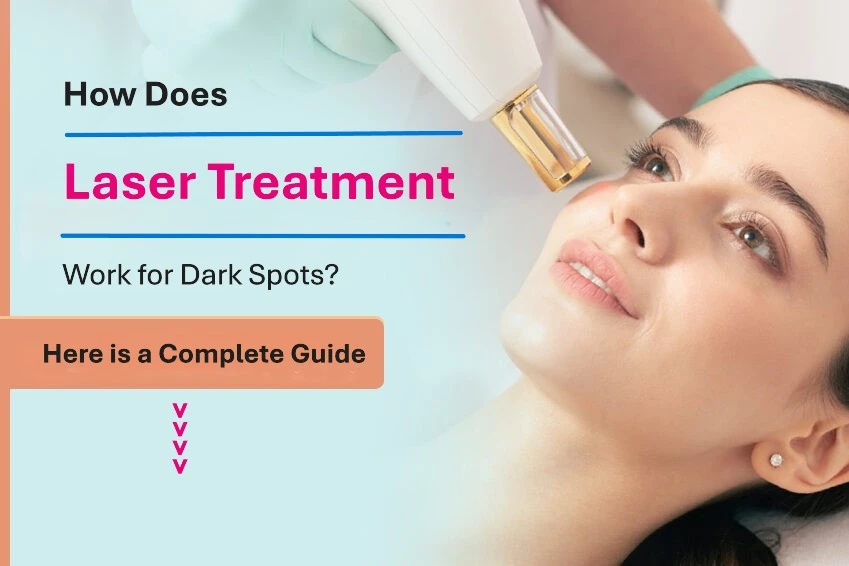How Does Laser Treatment Work for Dark Spots? Understanding the Science Behind Clearer, Even-Toned Skin
How Does Laser Treatment Work for Dark Spots? Understanding the Science Behind Clearer, Even-Toned Skin
Dark spots—whether from sun damage, aging, acne scars, or hormonal changes—are a common skin concern that many people find difficult to treat with creams alone. For stubborn pigmentation, laser treatments have become an increasingly popular option. But how exactly do lasers target dark spots, and what makes them effective? Let’s explore how laser treatment works, what types are used, and what you can realistically expect.
What Causes Dark Spots?
Dark spots, often called hyperpigmentation, develop when certain areas of the skin produce too much melanin, the natural pigment that gives skin its color. This can happen due to sun exposure (solar lentigines), inflammation from acne (post-inflammatory hyperpigmentation), hormonal changes (melasma), or simply the natural aging process.
How Lasers Target Pigment
Laser treatments use highly focused beams of light to break down excess pigment in the skin. The principle behind this is called selective photothermolysis—meaning the laser is tuned to target only melanin (the pigment) without damaging surrounding tissue.
When the laser energy hits the pigmented area, it heats and shatters the melanin into smaller particles. These fragments are then naturally cleared away by the body’s immune system over time, gradually fading the dark spot.
Types of Lasers for Dark Spots
Not all lasers work the same way. Here are some of the most common types used for pigmentation:
-
Q-switched lasers (e.g., Nd:YAG): These deliver short, powerful bursts of energy that specifically target melanin, making them effective for deeper pigmentation and certain birthmarks.
-
Pico lasers: Newer technology that uses ultra-short pulses to break pigment into even finer particles, often leading to faster clearance and less downtime.
-
Fractional lasers (e.g., Fraxel): Rather than targeting just pigment, these treat tiny “fractions” of skin, stimulating collagen production and improving texture along with fading pigmentation.
The choice of laser depends on factors like skin tone, type of pigmentation, depth of the pigment, and your skin’s sensitivity.
Benefits of Laser Treatment for Dark Spots
-
Precision: Lasers can focus on specific pigmented areas without affecting the surrounding skin.
-
Faster results: Many people see significant improvement after a few sessions, compared to months of topical treatments.
-
Improved texture: Some lasers also help smooth fine lines and boost collagen for healthier-looking skin.
Considerations and Risks
While effective, laser treatments aren’t without risks:
-
Temporary redness, swelling, or peeling: Common after treatment, but usually resolve within days.
-
Post-inflammatory hyperpigmentation (PIH): Especially in darker skin tones, the skin may produce more pigment in response to the heat, sometimes worsening dark spots temporarily.
-
Multiple sessions: Most dark spots need several treatments spaced weeks apart to achieve the best results.
-
Strict sun protection: Newly treated skin is more sensitive; wearing broad-spectrum sunscreen daily is essential to prevent recurrence or new spots.
Is Laser Right for Everyone?
Not always. People with very dark skin tones or active skin conditions (like eczema or severe acne) may be better suited to other treatments, such as chemical peels, microneedling, or prescription creams.
Bottom Line
Laser treatments for dark spots work by breaking down excess melanin so your body can naturally clear it away. When performed by a trained professional and combined with daily sun protection and gentle skincare, they can significantly improve stubborn pigmentation and help restore a more even, radiant complexion. Consulting a dermatologist is the best first step to determine if laser treatment is right for your unique skin needs.

Related Blog
What Causes Oily Skin and Can It Be Managed Naturally? Exploring Root Causes and Gentle Solutions
Aug 2, 2025 by Admin
General
What Are the Signs That You Have Sensitive Skin? Key Symptoms to Help You Identify This Delicate Skin Type
Aug 1, 2025 by Admin
General